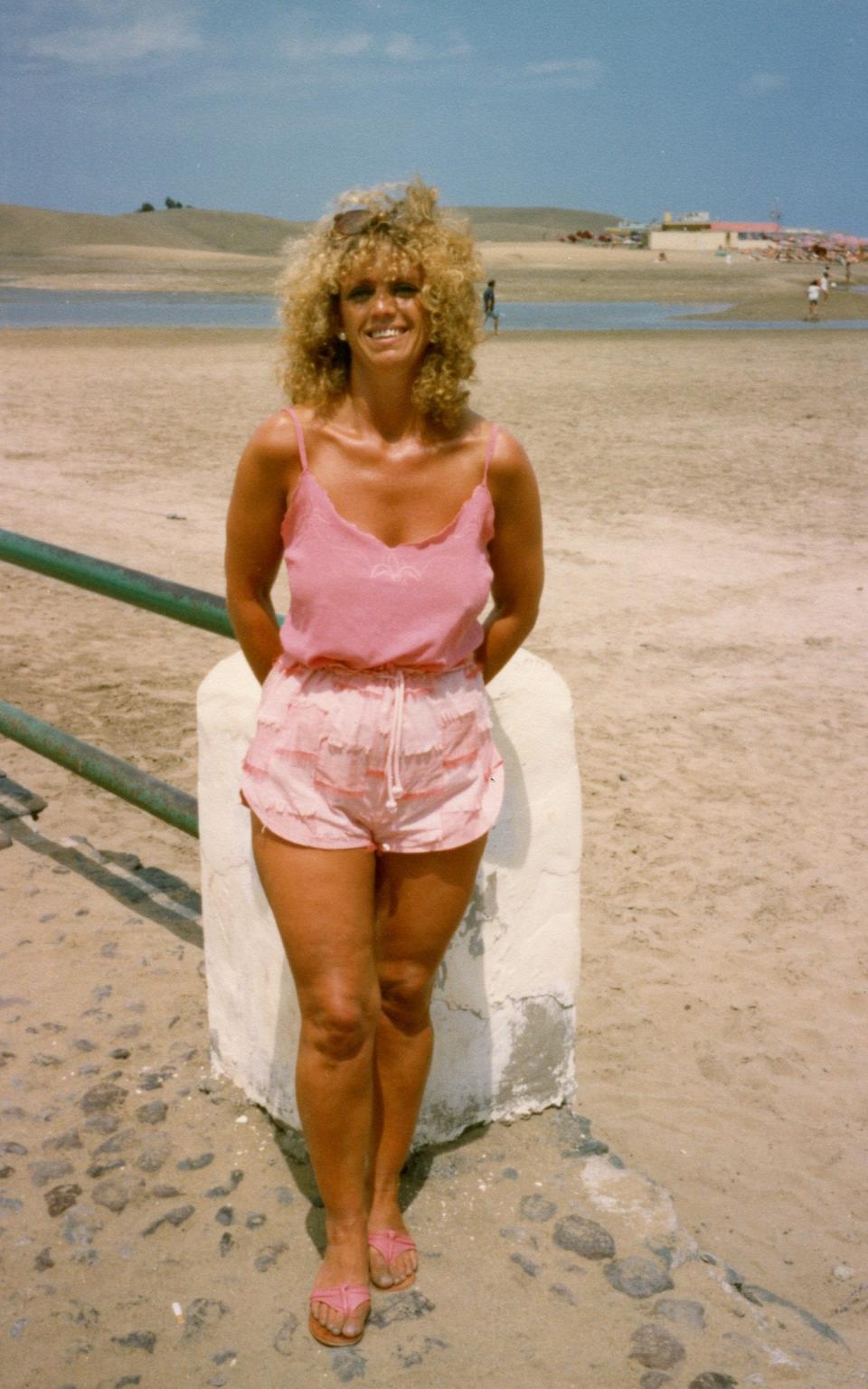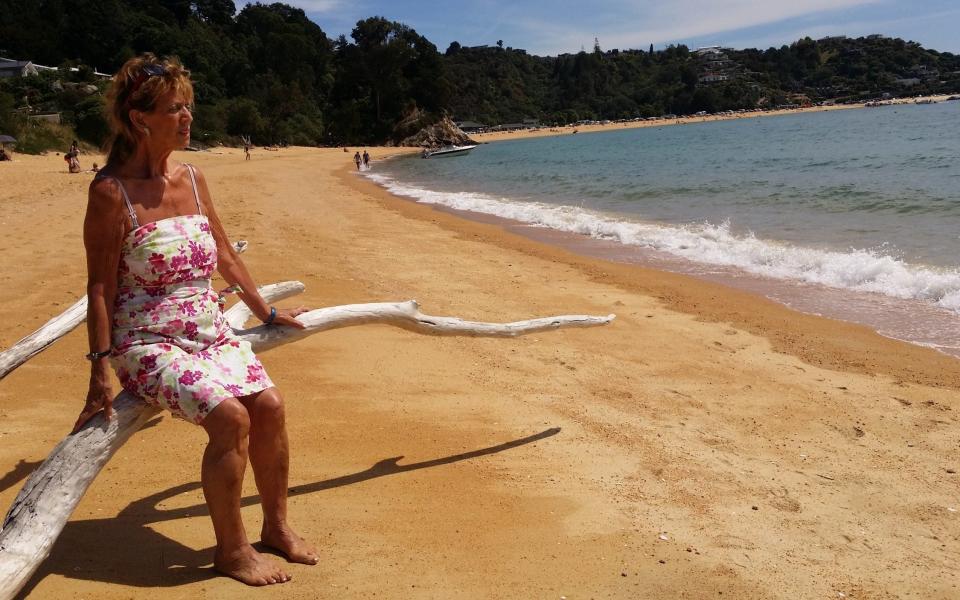My dear wife Lorraine can no longer walk or talk and is doubly incontinent. She now lives in a hospital bed in our front room in Surrey. And yet, despite the fact that Alzheimer’s disease has taken so much from her, the woman I fell in love with is still there. Lorraine may not recognize me – sometimes she looks at me and doesn’t even see me – but she still giggles when she hears my voice, and smiles when I play our favorite classical music, the Adagio of Spartacus and Phrygia by Spartacus. We are both 77 now and ours is a love story that has lasted almost 60 years.


We met on a New Zealand farm in 1969. After working as an engineer in Britain, I decided to travel – overland from North Africa, through Syria and Afghanistan, eventually ending up in Nelson, a city in the north of south of New Zealand. Island. I got a job picking tobacco: Lorraine, a Kiwi, was picking apples.
I remember sitting on the kitchen floor and watching her walk in: Wow, I thought. Lorraine was absolutely fantastic, but she also had that girl-next-door quality that I loved: she was approachable and quick to smile. Lorraine grew up in Invercargill and learned Scottish country dancing as well as the Haka, which she would perform throughout her life when the All Blacks played.


We came back to Britain together and settled in the countryside near Croydon in Surrey, where we eventually married in 1980. Neither of us really wanted children, but we loved our dogs, soft-coated Wheaten Terriers and a Lhasa Apso. We threw ourselves into the business we started in our second bedroom, creating document binding machines that were eventually used all over the world.
Our party took us to some very glamorous places. In 1986 we received the BBC Radio 4 Small Business Enterprise Award, presented by Prince Charles. Music was a great passion of ours – we often ended the evening at Ronnie Scott’s in London, where we danced until the early hours. And we loved to travel. Every place we visited, Lorraine bought a dress. In the wardrobe were “the St-Tropez dress”, “the Marbella dress” and “the Barcelona dress”.
But we also loved our family life. We lived next to a golf course, and I loved hearing Lorraine coming back in her Toyota Rav 4, the dogs barking. We were both avid, fast readers and often played a game where we came up with a long word and checked if the other could spell it.


In 2010, when she was 64, Lorraine suddenly seemed to lose her sense of smell. Soon after, she started talking strangely: in unfinished sentences, instead of short sentences. “I go…?” she would say, and then walk away without finishing what she was going to say. When I noticed this, Lorraine seemed aware of it, but couldn’t do anything about it. Although this was frustrating at times, I wasn’t concerned; I just got used to it and became adept at understanding her.
But other things started to change. Always one to pick the perfect outfit for the occasion, Lorraine became lethargic about the way she dressed. She would choose the outdated sweater with the holes, instead of the newer, stylish top. The dresses from Barcelona and St-Tropez no longer meant anything to her.


In the kitchen, Lorraine salted the potatoes two or three times, unknowingly burned her arm on the stove, and left the gas on while eating.
It honestly didn’t occur to me that there was anything wrong with Lorraine. I guess I thought this was a natural part of growing older. I had barely heard of Alzheimer’s and certainly didn’t think it had anything to do with us. Furthermore, these strange episodes only took a few minutes each day, and the rest of the time she was ‘normal’. So I made practical changes: I switched from gas to electricity and shortened Lorraine’s wardrobe.
Finally, in 2012, I took Lorraine to the doctor because of pain in her right hip. The doctor clearly saw something disturbing in Lorraine’s behavior and referred us to a memory clinic. The psychiatrist there told us that this could be the beginning of Alzheimer’s disease. How can this be so? I wondered. How can it happen to us? Lorraine was always such a healthy person.
At the clinic, Lorraine was led to another room to take a memory test. She scored 16/30. I thought this sounded pretty good, but the consultant said that ideally she had answered all the questions correctly. When Lorraine was asked to name the President of the United States (Barack Obama at the time), she had replied: “I don’t know, but he has a dog called Bo.” She couldn’t name any pictures of an elephant or a tiger.
The doctor kindly told us that Lorraine had Alzheimer’s. I asked if she could take pills, and she told us there were, but they didn’t work and “there was nothing that could be done.” As you can imagine, I was deeply upset, but decided to put on a happy face – and that has been my attitude ever since. Since Lorraine never knew anything was wrong with her, I decided we would continue to live our lives as normally as possible for as long as we could.
Okay, I said, so Lorraine has Alzheimer’s, but we’ll continue to do the exact same things as if she hadn’t. We continued to travel for the rest of the 2010s. We spent winters in Tenerife and much of the pandemic there. Most of the time we were happy, but there were also difficult moments for me – like the time I took Lorraine to Kaiteriteri Beach in New Zealand. It was the place where we first met: I wanted her to remember it, and was heartbroken when she couldn’t.


We have made other adjustments. Even before her diagnosis, Lorraine did not enjoy being at a restaurant with a group of friends, and often wanted to go home early. But even when Lorraine was in a wheelchair, I would hold her hands and we would dance around. We joined the local Alzheimer’s Singing for the Brain group, run by the brilliant Peter Edwards.
Unfortunately, Lorraine has deteriorated considerably in recent years. She is now confined to a hospital bed in the living room. I sleep upstairs and wake up regularly during the night to go downstairs and check on her.
This time last year. I realized we needed the help of professional caregivers, and eventually we found a great agency called Helping Hands. It now takes two people to wash and bathe Lorraine – the same people come three days a week, from 9am to 9.30am. The rest is up to me.
Our life together now is different than I expected, but I am completely committed to my wife. She is still “in there”, and to this day she becomes happier when I play music for her – she especially loves it when I play Memory by Cats on the guitar. Last year I was afraid that if I died no one would know Lorraine’s story, so I made a video called “Lorraine’s Goodbye”.
The way I see this is just a new phase in life. It’s like finishing playing a professional sport like hockey or rugby. You hang up your boots, but life goes on – it just ends up in another state. There is no ‘poor Lorraine’. I see that we are both lucky: we have a bond that will last a lifetime.
As told to Miranda Levy
The Alzheimer’s AssociationThe new Long Goodbye campaign starts on March 22
Recommended
How to recognize the first early signs of Alzheimer’s disease and dementia
read more